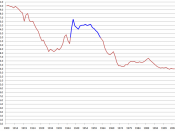This essay will explain, through application of organisational behaviour theory to an individual's case study, some of the individual work related terminal and instrumental values, as set out in the Rokeach Value Survey (RVS), of Andre Hamilton, a young black man, who completed a degree in management after spending eight years in the US Air Force. He subsequently applied for and was placed in two jobs, first at GMAC, which he left after working for a few days, to pursue greater opportunity of management and a secure salary, and secondly with The Office Supply Store (TOSS). A link will be established between Andre's work related values and his work related attitudes and their influence on his career and work life. Values and attitudes will be defined and a discussion on the three components of an attitude will be made, followed by the application of Leon Festinger's (1950) cognitive dissonance theory to Andre's case.
An explanation of Andre's resulting job satisfaction, job involvement and organisational commitment will be made and predictions will be given on how his job satisfaction will affect his work performance in terms of turnover; absenteeism; productivity and organisational citizenship behaviour, showing the interrelationship of Andre's individual work related values, attitudes and job satisfaction with his behaviour, career and work life.
Individual employees are uniquely complex and it is through the study of organisational behaviour theories that an understanding of the relationship between the employee's life and work related values, attitudes and behaviour, could be achieved. Values are things of importance or worth to an individual. They are "â¦basic convictions that a specific mode of conduct or end-state of existence is personally or socially preferable to an opposite or converse mode of conduct or end-state of existence" (Robbins et al. 2004, p.68) and they include a judgemental element...


